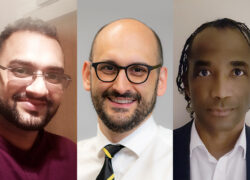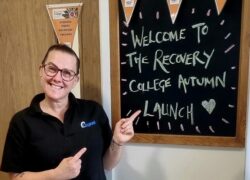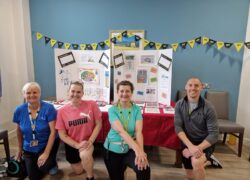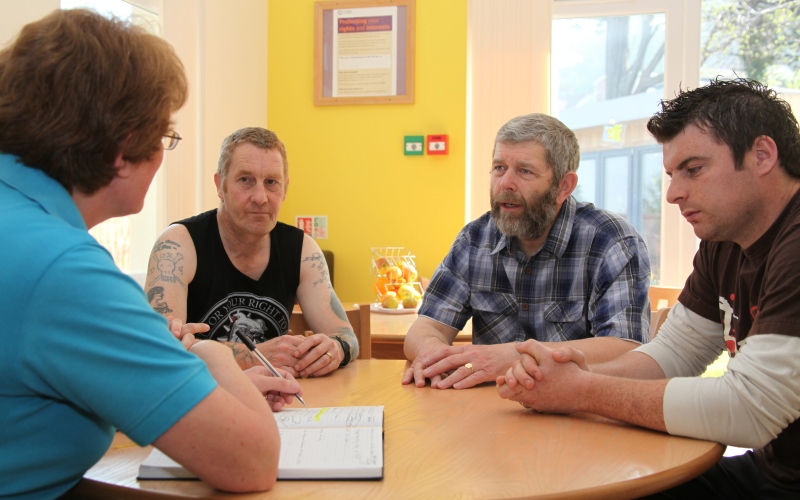
Psychological Therapies
The Psychology Department is made up of a team of HPC Registered Clinical Psychologists, a Psychology Assistant, a Drug & Alcohol Therapist and a Drug & Alcohol Therapy Assistant. Sessional workers providing music/art therapy are also employed as and when necessary. Between them, the staff have a wide range of experience in community, inpatient and secure psychiatric settings.
The Clinical Psychologists cover all four wards and the Lodge offering individual therapy, group therapy, staff supervision, risk assessments, staff training programmes and consultation. Individual psychological assessment can incorporate aspects of mental health, personality characteristics, cognitive ability, and neurological functioning. A broad range of therapeutic approaches are utilised, including Cognitive Behavioural Therapy (CBT), Dialectical Behaviour Therapy (DBT), Psychodynamic approaches, Problem Solving Therapy, Behavioural Programmes and Family Therapy. Specific work targeting index offences can also be undertaken. The psychologists are regularly present at MDT discussions and ward rounds in order to encourage psychological thinking in all aspects of patient care.
The Psychology Department also co-ordinate various groups. Patients suitable for DBT attend weekly group sessions and are allocated a trained DBT therapist for weekly 1:1 sessions. A Hearing Voices group is held on a weekly basis, facilitated by members of the local Hearing Voices Network. There are also a selection of art/music therapy groups available, and groups promoting psychological well-being including relaxation, pampering sessions, psycho-education, etc.
The Psychology Department has been active in research projects, publishing articles, conducting audit/service development, and encouraging service user involvement at all levels. They are able to carry out a range of outcome measures enabling close and accurate monitoring of patients’ progress, which is fed back to the home team on a regular basis.
Drug & Alcohol Therapy
Our specialist drug and alcohol programme is available to all service users within the hospital including those at The Lodge. The hospital employs dedicated drug and alcohol workers who creatively cover a range of bio-psycho-social work from harm minimisation to total abstinence. Techniques used include motivational interviewing and cognitive behavioural therapy to help patients move towards changing risky behaviours; involving illegal drugs, alcohol and the mis-management of prescribed medication. The programme is supported by senior peers (local volunteers) who are further along the road to recovery from drug and alcohol misuse/addiction, and whose lives have been further complicated by mental health difficulties.
Narcotics Anonymous (NA) and Alcoholics Anonymous (AA) meetings are available within the hospital for service users wishing to commit to abstinence. They are facilitated by the Hospitals and Institutions branch of the NA/AA fellowship and are independent of the hospital. 12 Step work is also available to service users who are fully engaged in AA and or NA meetings and wish to learn more about the 12 Steps that underpin this abstinence based philosophy. Again these sessions are externally facilitated by individuals who already “work the steps” in their daily lives as a coping strategy to support them to maintain their recovery in the community.
When service users are ready to move on we complete a piece of work with them regarding recovery and risk to relapse. This offers the Home or Relocation Team a package they can use to ensure a seamless continuation of treatment and care during what is a crucial transition stage of the recovery process.
Smoking
Cygnet Hospital Kewstoke promotes healthy lifestyle choices and offers support to any patient wishing to change their smoking habits or stop smoking completely. Twice a year the Drug & Alcohol team, in conjunction with the ward doctors, present two workshops and a follow up session on each ward to inform patients of options and support available here at the hospital.
Occupational Therapy
The Occupational Therapy (OT) department comprises of a team of Occupational Therapists, Technicians, Activity Co-ordinators and a Fitness Instructor who work with service users across the hospital.
The Occupational Therapists and Technicians work closely with Activities Co-ordinators and the Fitness Instructor in order to encourage mixed-ward participation in activities where appropriate. The team provide a variety of group and one-to-one sessions which include functional ADL and community assessments and therapeutic activities.
After referral and initial assessment the patient and OT agree a plan. Interventions are graded according to the patient’s functional capabilities and are then periodically reviewed. Interventions may include goal-setting, functional ADL assessments, social skills practice, vocational skills training or work on self-esteem or anxiety.
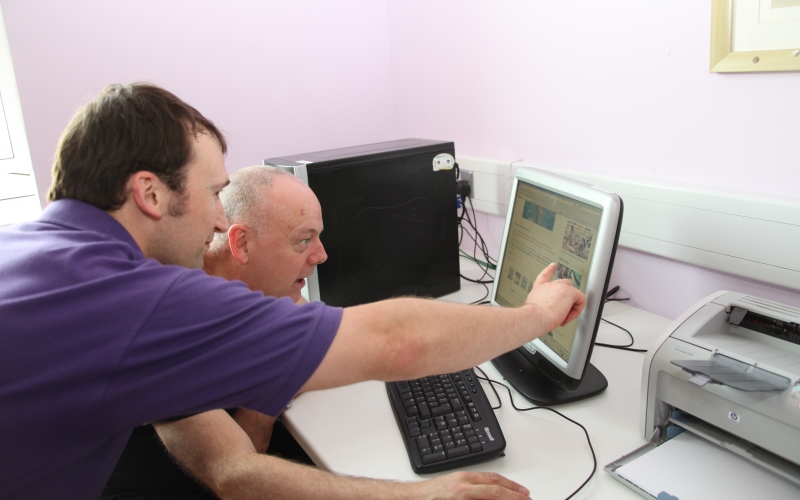
Therapeutic activities include horse-riding, gardening, cooking, DJ workshop, street dance, trips to the driving range, fishing and social outings such as bowling, cinema, shopping, museums, crazy golf and the aquarium. Fitness sessions encompass gym work, swimming, walking, running and cycling. IT sessions are available to all service users and two service users have achieved a City and Guilds qualification through facilitation of courses from Weston College. Local resource centres in Weston town centre are accessed to increase the range of activities and social contact available, helping with service users’ confidence and motivation.
The OT team are committed to client-centred, holistic practice so the aim is that activities are not only within the limits of service users’ physical, social or cognitive capacity, but are also meaningful to them. The team encourage service users to work towards realising a structured and balanced occupational life.
OT practice at Kewstoke is underpinned by the Model of Human Occupation (Kielhofner, 1985). Behavioural, developmental, rehabilitative, cognitive-behavioural and psychodynamic frames of reference are used to guide interventions. The OTs and OT Techs use monthly working lunches to analyse activities and also to keep up to date with current research and best practice by studying journal articles. They also attend CPD events where available and appropriate.
One of the OTs is a member of the Dialectical Behaviour Therapy (DBT) team and OT staff liaise with Psychology staff to provide as comprehensive and co-ordinated a programme as possible for the benefit of the service users at Kewstoke.
